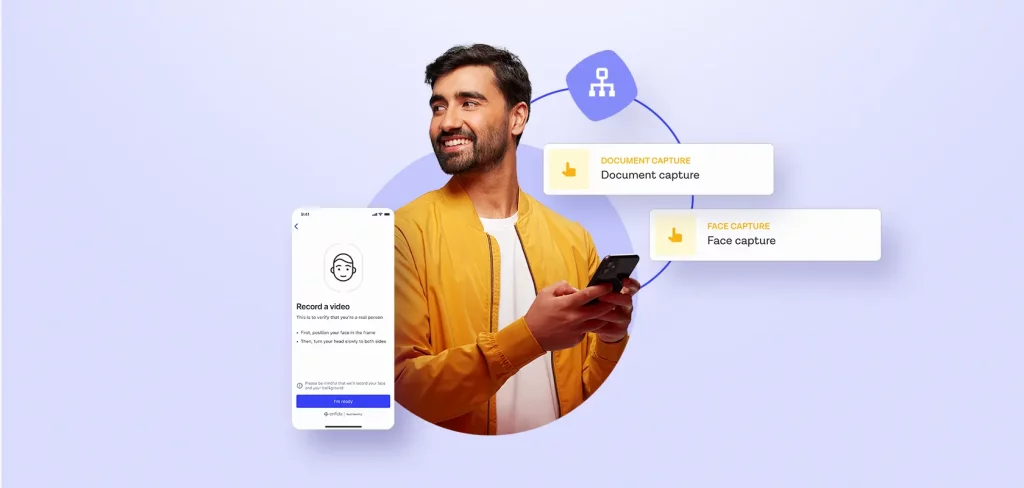
Every day, people need to prove they are who they say they are. This can be so they can purchase an age restricted product, check into a hotel, open a new account, or any of a variety of other reasons. A person’s identity is the key to accessing the goods, services, and opportunities they want — and is proven by providing credentials with personal information including their name, date of birth, and Social Security number. Because of the importance of this information and the risk of fraud that could cost them both time and money, individuals need to be confident that their digital identity is protected — whether they are online or in person.
The rise of reusable digital identity
Proving who you are in person is straightforward — just take out your driver’s license or other credential and present it for inspection. But with online transactions, that’s where things can get more complicated.
For years, we relied on knowledge-based verification: provide a name, Social Security number and answer a few questions that line up with information found in a credit file. But with data breaches exposing personal information, this made it easy for fraudsters to impersonate someone. Identity verification continues to evolve, relying on passive technical signals like geo-location or IP address along with verifying identity documents and comparing it to a selfie.
A challenge in the US is that our identity documents — birth certificates, Social Security cards, and in many states driver's licenses — are stuck in the physical world. While we are seeing some states move towards offering mobile drivers licenses (mDLs), the progress is slow and not likely to be widely available in all states. A reusable identity fills this gap in a way that is privacy protecting and secure while also convenient.
What is reusable identity?
A reusable identity is a user-controlled identity credential that can be stored on a device, used virtually and is backed by a level of confidence that the individual is who they claim to be. Verify once and use it when you need it. Reusable identities can be used in person to go through security at TSA, check in to a hotel, or online.
The benefits of reusable identity
Whether online or in person, today’s approach of repeatedly reverifying users creates friction with longer wait times, as well as privacy and security concerns due to users having to part with their data and businesses having to store it.
Having to reverify again and again takes time — and in the modern world we are always looking for a way to move faster, in a more convenient manner. Reusable identities allow individuals to assert their identity and move on to the service they need.
For good reason, identity documents contain a wealth of information — however not all of that information is needed every time that a person is verified. There is no reason that a bouncer at a bar needs to know if a college student is an organ donor or lives around the corner — the bouncer only needs to know if she’s 21. A reusable identity puts the individual in charge of their data — sharing what they need to when they want to — protecting their privacy.
A reusable identity can be stored on an individual’s device — not only keeping them in control of their data but also eliminates the need for a centralized database that creates a honeypot for fraudsters to target.
How Onfido and Airside are building the future of reusable identity
The opportunities with a digital identity are limitless. It can include more than just the basic information found on a government issued id and can be combined with other credentials that open doors and unlock opportunities based on personal interests.
With Onfido’s recent acquisition of Airside, we will soon give you even more control than ever over how your IDs and personal information are used. At Onfido, we work to help companies ensure trusted interactions with their customers. When operating online, businesses need to be sure who is on the other side of the screen. Until now, a physical identity document, combined with a biometric verification tool like Motion to prove user liveness, has been the best way to verify that you are who you claim to be.
Soon, Onfido and Airside will enable companies to give customers even more privacy and control with the ability to save a digital ID credential on their devices and only share what's required, not what's unnecessary. A user can stop sharing their information, revoking access when the transaction is complete — giving them power they don’t have with traditional physical IDs. Their data also remains secure and not stored in any centralized database that is ripe for hackers.
Onfido and Airside will empower you to determine exactly what is shared, for how long, and with whom. You could buy alcohol, or place a bet, for example, without ever having to hand over unnecessary data, like your home address or ID number.
See how we’re building ‘verify once, share anywhere’ identity on our upcoming webinar with Mike Tuchen (CEO, Onfido), Adam Tsao (Founder, Airside), and Yuelin Li (CPO, Onfido) on June 21st / 22nd.






